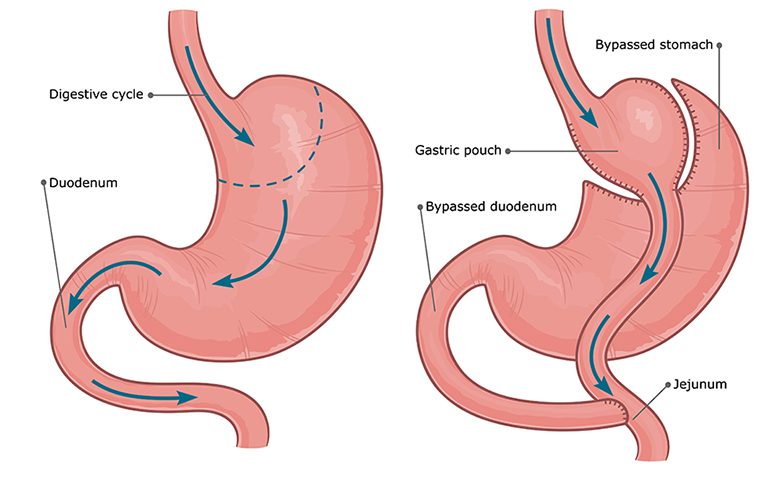About Our Program
Cooley Dickinson Hospital’s Bariatric and Weight Management Program has earned accreditation as a “Comprehensive Center” by the American College of Surgeons (ACS) and the Metabolic and Bariatric Surgery Accreditation and Quality Improvement Program (MSBAQIP). Learn more about the surgical and non-surgical options available to patients of our program, or read our frequently asked questions for additional information.
Surgical Options
There are two types of bariatric surgery your surgeon will discuss with you:
Vertical Sleeve Gastrectomy
This procedure restricts the amount of food that can be eaten; your surgeon will create a smaller stomach pouch, known as a sleeve. Another effect of the surgery is decreased secretion of a hunger hormone, called ghrelin.

This procedure both restricts the amount of food that can be eaten and decreases the absorption of nutrients and calories.

Non-Surgical Options
Obesity is a complex, chronic and relapsing disease. Many people with obesity struggle for years to lose weight and find it increasingly difficult to prevent weight re-gain. There are several medications that can, in combination with dietary changes, help people with obesity lose weight and maintain their weight loss. Some of the most effective medications for weight loss work by addressing underlying imbalances in hormones that effect appetite regulation and energy storage. Medication management may be appropriate for people who have been trying to lose weight for at least 6 months with lifestyle changes, and who have a BMI over 30, or a BMI over 27 with obesity-related health problems.

Patients who are interested in learning more about medication management for their obesity can work with Sofia Buford, an Adult Nurse Practitioner who specializes in medical weight management. Sofia has a professional certification in obesity management through The Obesity Society. She received her Masters in Science of Nursing from Yale University in 2011 and, before joining Cooley Dickinson Bariatrics and Weight Management, she spent over a decade working in in internal medicine, with a special interest in eating disorders.
Sofia is passionate about destigmatizing body weight and size. She loves collaborating with her patients to address their health and functional concerns first and foremost. Her approach to medical weight management is founded in the understanding of obesity as a neuroendocrine disease with behavioral components. Sofia works in collaboration with the wonderful team at Cooley Dickinson Bariatric and Weight Management to offer multiple evidenced based treatment options. Sofia is also bilingual in Spanish and English dedicated to healthcare equity and to providing LGBTQ-celebratory care.
We’re Here to Help
Our team is here to support you along the way and give you the education and accountability you need to be successful, but this is going to be hard work! Weight loss surgery is a tool and not a “quick fix” or “magic pill.” Ready to take the first step in a life-changing journey? Interested in learning more? Our team of surgeons, dietitians, navigators, surgical schedulers and front desk staff look forward to developing a plan to help you achieve your weight loss goals.
To learn more, request more information or call us today at 413-584-4637.


